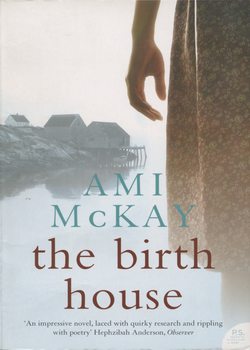Читать книгу The Birth House - Ami McKay, Ami McKay - Страница 7
Prologue
ОглавлениеMY HOUSE STANDS at the edge of the earth. Together, the house and I have held strong against the churning tides of Fundy. Two sisters, stubborn in our bones.
My father, Judah Rare, built this farmhouse in 1917. It was my wedding gift. A strong house for a Rare woman, he said. I was eighteen. He and his five brothers, shipbuilders by trade, raised her worthy from timbers born on my grandfather’s land. Oak for stability and certainty, yellow birch for new life and change, spruce for protection from the world outside. Father was an intuitive carpenter, carrying out his work like holy ritual. His callused hands, veined with pride, had a memory for measure and a knowing of what it takes to withstand the sea.
Strength and a sense of knowing, that’s what you have to have to live in the Bay. Each morning you set your sights on the tasks ahead and hope that when the day is done you’re farther along than when you started. Our little village, perched on the crook of God’s finger, has always been ruled by storm and season. The men did whatever they had to do to get by. They joked with one another in fire-warmed kitchens after sunset, smoking their pipes, someone bringing out a fiddle … laughing as they chorused, no matter how rough, we can take it. The seasons were reflected in their faces, and in the movement of their bodies. When it was time for the shad, herring and cod to come in, they were fishermen, dark with tiresome wet from the sea. When the deer began to huddle on the back of the mountain, they became hunters and woodsmen. When spring came, they worked the green-scented earth, planting crops that would keep, potatoes, cabbage, carrots, turnips. Summer saw their weathered hands building ships and haying fields, and sunsets that ribboned over the water, daring the skies to turn night. The long days were filled with pride and ceremony as mighty sailing ships were launched from the shore. The Lauretta, The Reward, The Nordica, The Bluebird, The Huntley. My father said he’d scour two hundred acres of forest just to find the perfect trees to build a three-masted schooner. Tall yellow birch, gently arched by northwesterly winds, was highly prized. He could spot the keel in a tree’s curve and shadow, the return of the tide set in the grain.
Men wagered their lives with the sea for the honour of these vessels. Each morning they watched for the signs. Red skies in morning, sailors take warning. Each night they looked to the heavens, spotting starry creatures, or the point of a dragon’s tail. They told themselves that these were promises from God, that He would keep the wiry cold fingers of the sea from grabbing at them, from taking their lives. Sometimes men were taken. On those dark days the men who were left behind sat down together and made conversation of every detail, hitching truth to wives’ tales while mending their nets.
As the men bargained with the elements, the women tended to matters at home. They bartered with each other to fill their pantries and clothe their children. Grandmothers, aunts and sisters taught one another to stitch and cook and spin. On Sunday mornings mothers bent their knees between the stalwart pews at the Union Church, praying they would have enough. With hymnals clutched against their breasts, they told the Lord they would be ever faithful if their husbands were spared.
When husbands, fathers and sons were kept out in the fog longer than was safe, the women stood at their windows, holding their lamps, a chorus of lady moons beckoning their lovers back to shore. Waiting, they hushed their children to sleep and listened for the voice of the moon in the crashing waves. In the secret of the night, mothers whispered to their daughters that only the moon could force the waters to submit. It was the moon’s voice that called the men home, her voice that turned the tides of womanhood, her voice that pulled their babies into the light of birth.
My house became the birth house. That’s what the women came to call it, knocking on the door, ripe with child, water breaking on the porch. First-time mothers full of questions, young girls in trouble and seasoned women with a brood already at home. (I called those babies “toesies,” because they were more than their mamas could count on their fingers.) They all came to the house, wailing and keening their babies into the world. I wiped their feverish necks with cool, moist cloths, spooned porridge and hot tea into their tired bodies, talked them back from outside of themselves.
Ginny, she had two …
Sadie Loomer, she had a girl here.
Precious, she had twins … twice.
Celia had six boys, but she was married to my brother Albert … Rare men always have boys.
Iris Rose, she had Wrennie …
All I ever wanted was to keep them safe.
